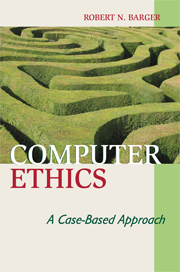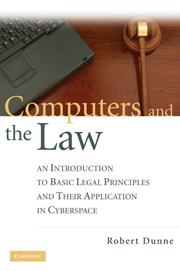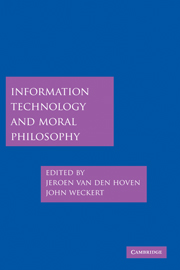Computer Ethics
Teaches students how to solve ethical dilemmas in the field of computing, taking a philosophical, rather than a legal, approach to the topic. It first examines the principles of Idealism, Realism, Pragmatism, Existentialism, and Philosophical Analysis, explaining how each of them might be adopted as a basis for solving computing dilemmas. The book then presents a worksheet of key questions to be used in solving dilemmas. Twenty-nine cases, drawn from the real-life experiences of computer professionals, are included in the book as a means to let students experiment with solving ethical dilemmas and identify the philosophical underpinnings of the solutions.
- Explains the steps of the ethical decision making process in handy worksheet form
- Appendix with suggested topics for presentations, discussion, and papers
- End of chapter summaries and questions foster better understanding of the material
Reviews & endorsements
"Barger (U. of Notre Dame) presents an introduction to the field of computer ethics. He first deals with the philosophy of ethics and explores efforts to construct a unifying theory of computer ethics. He also addresses psychological factors affecting computer ethics, whether there can be a professional ethics of computing, computer ethics and international development, and ethics and robotics. For most of the remaining chapters, each topical discussion is followed by a review of related cases encountered by computer professionals. These chapters discuss computer theft and piracy, the issue of privacy, computers and power, and miscellaneous topics. A final chapter addresses the topic of parasitic distributed computing."
Book News, Inc.
"... a must read for all computing professionals."
J. Beidler, University of Scranton for Choice Magazine
"This book is a thorough treatment of the problems and possible solutions of a myriad of computer-related ethical concerns. The first thing that the reader becomes aware of is the fact that Barger is obviously classically educated. His coverage of the philosophical theories on which solutions to computer ethics problems may be found is excellent; his approach in the construction of the book is refreshingly different. The book is a work of merit. I think it would be an excellent choice for a course in computer ethics, privacy, or security."
James Van Speybroeck, Computing Reviews
Product details
June 2008Paperback
9780521709149
264 pages
228 × 152 × 14 mm
0.36kg
11 b/w illus.
Available
Table of Contents
- 1. Introduction
- 2. The computer as a humanizing agent
- 3. Philosophic belief systems
- 4. A philosophic inventory
- 5. The possibility of a unified ethical theory
- 6. The ethical decision making process
- 7. Psychology and computer ethics
- 8. The computing field as a profession
- 9. Computer-related codes of ethics
- 10. Computer ethics and international development
- 11. Robotics and ethics
- 12. Theft and piracy concerns
- 13. Cases concerning theft and piracy
- 14. Privacy concerns
- 15. Cases concerning privacy
- 16. Power concerns
- 17. Cases concerning power
- 18. A miscellaneous collection of cases
- 19. Parasitic computing case
- Appendix. Topics for presentations, discussions, and papers.






